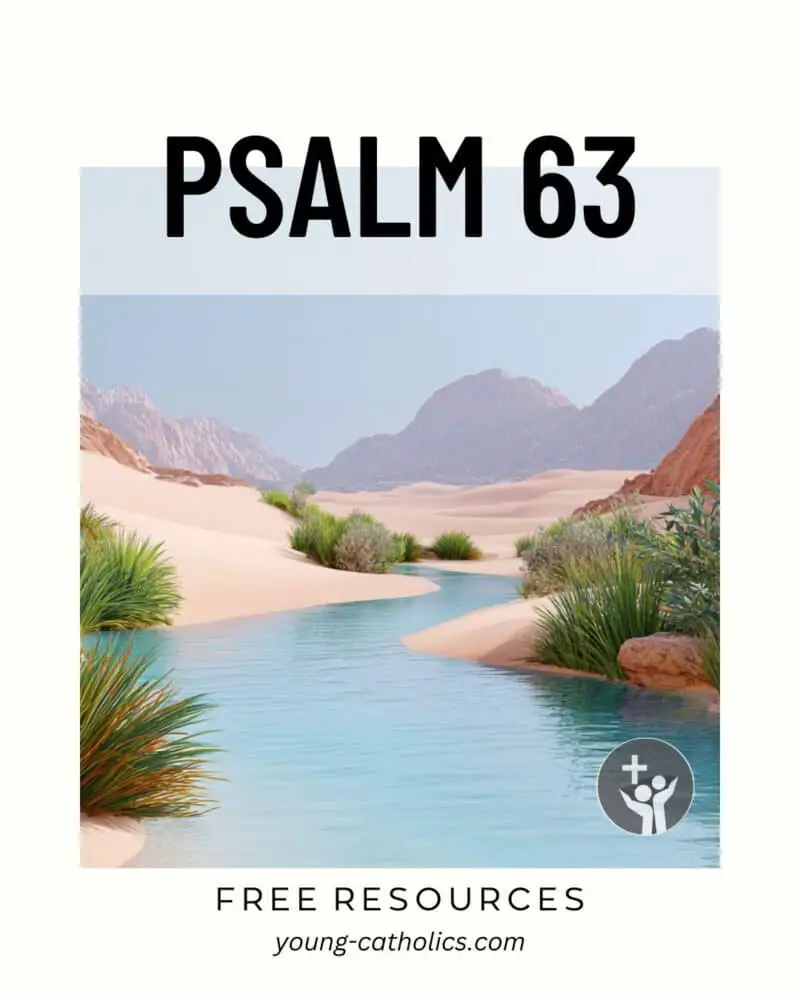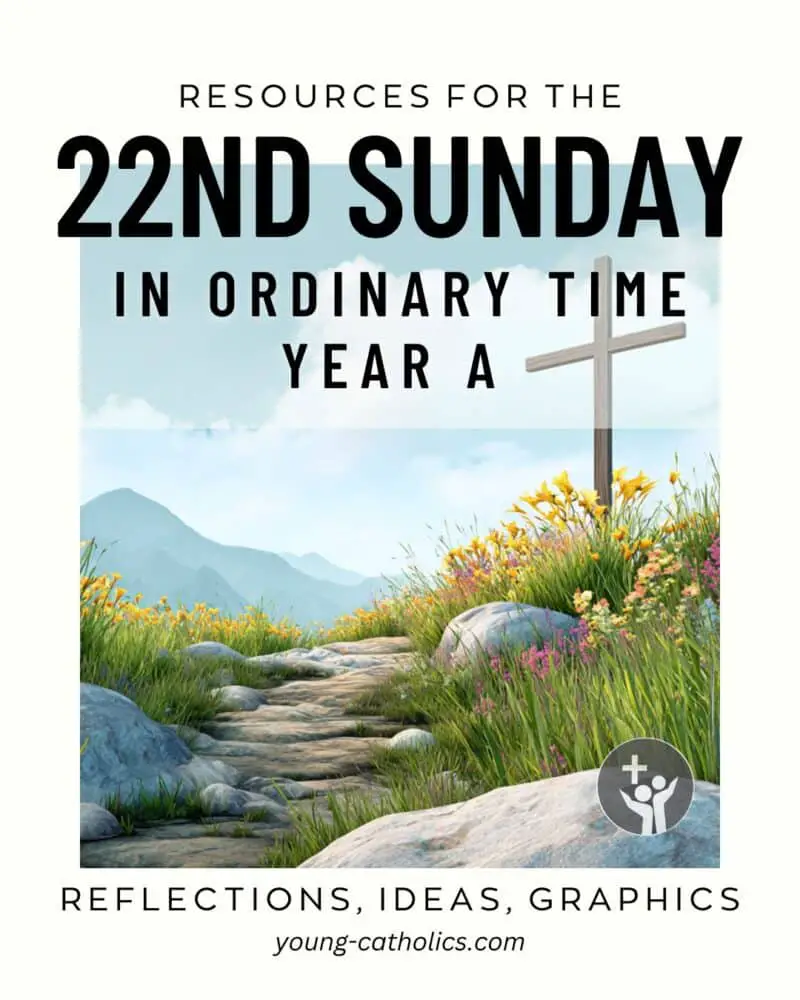Psalm 63

Psalm 63 is a prayer that comes from a place of deep longing for God. The writer feels far away and dry, like being in a desert without water. In that emptiness, he turns to God with trust and hope. The psalm shows that even in hard times, God is the only one who can satisfy the human heart.
This psalm is often called a song of thirst for God. It reminds us that nothing else in life can truly fill us. Riches, success, or comfort cannot give lasting peace. Only God can. The psalmist speaks with honesty about this need, and it is something we all can understand.
Psalm 63 also has words of praise. The writer does not only ask for help, but he also remembers the times he has seen God’s power and kindness. Remembering these moments gives him strength. Even in the middle of trouble, he chooses to bless God with his lips and raise his hands in worship.
For Christians, Psalm 63 points to our life with Christ. We are reminded that our deepest hunger is met in Him. The psalm encourages us to seek God with trust, even when life feels dry or difficult. It tells us to cling to Him, knowing that His love is stronger than anything else.
A Song from the Wilderness
This psalm comes from the second part of the Book of Psalms, which includes Psalms 42 through 72. Many of these psalms are linked to King David, who is remembered as a man of prayer and song. Psalm 63 is one of the psalms that carries his name.
The setting behind this prayer is thought to be a time when David was in the wilderness. He was hiding from those who wanted to harm him. The dry and lonely land gave him a picture of what it felt like to be far from the safety and joy of God’s house. Out in the desert, David turned his longing into prayer.
The psalm speaks of thirst, hunger, and the search for safety. These images may come from David’s own experience as he wandered without rest. Yet even in that place, he lifted his eyes to God. He trusted that God’s love was stronger than the fear he faced.
Knowing this background helps us hear the psalm more clearly. It is not only a poem, but also a cry from a real person who clung to God when everything else was uncertain. This gives the words power and makes them easier for us to pray in our own times of struggle.
Thirsting for the Living God
One theme in this psalm is our deep need for God. The writer says his soul thirsts and his body longs, just as in a dry land without water. In Catholic faith, this reminds us that we are made for God. Nothing else can satisfy us. Our longing points us back to Him, just as the desert points us to the need for water.
Another theme is praise in the middle of struggle. The psalmist does not wait for life to be easy before lifting his hands. He blesses God even in the wilderness. Catholics see this in the Mass, where we give thanks and worship God in every season of life. Praise is not only for times of joy but also for times of need.
The psalm also speaks about trust. The writer says that God’s love is better than life and that God’s hand upholds him. For Catholics, this points us to God’s steadfast care. We cling to Him in prayer, in the sacraments, and in daily life, knowing He will never fail us.
A final theme is hope in God’s victory. The psalm ends with confidence that enemies will fall and that those who trust in the Lord will rejoice. For us, this points to Christ, who brings the victory of life over death. In Him, we have the promise that love and mercy will win.
Finding God in a Busy World
This psalm speaks to us today because many people feel worn out and dry inside. We live in a world full of noise and constant demands. It is easy to feel like we are walking in a desert, even if our lives look full from the outside. The psalm reminds us to seek God first, because only He can give true peace.
The words about thirst and hunger remind us that every person longs for more than comfort or success. We long for meaning and love that last. For Catholics, this longing is answered in prayer and in the Eucharist. At Mass, we are fed and our thirst is met in Christ.
This psalm also teaches us to turn to God in every season of life. When things are difficult, we can cling to Him. When things are going well, we can lift our hands in praise. The psalm calls us to stay close to God no matter what we face.
For people today, these verses can become a guide. They remind us to pause, to seek God in the middle of daily life, and to trust His care. In a restless world, the psalm points us to the stillness and joy that come from Him alone.
A Prayer Based on Psalm 63
Thirsting for You
Lord, sometimes life feels dry,
like walking through long days with no water.
I try to fill myself with many things,
but nothing satisfies me the way You do.
I remember times I felt close to You,
when prayer was full of joy and peace.
Help me hold on to those moments,
and remind me that Your love is better than life.
When I feel weak or afraid,
let me rest in Your care.
Hold me up when I cannot stand on my own.
Teach me to cling to You each day.
Lord, let my lips praise You,
not only when life is easy,
but also when I feel lost or tired.
Stay near to me always,
for You are my shelter and my joy.
A Prayer Used in Worship
In the Roman Catholic lectionary, this psalm is often prayed during Mass. It is used as a responsorial psalm, where the congregation joins in repeating a line of praise. The words about longing for God and finding joy in His presence fit well in the rhythm of worship.
This psalm is also found in the Liturgy of the Hours, which is the daily prayer of the Church. Priests, religious, and many lay people pray it often. The images of thirst and trust in God give strength to those who recite it at morning prayer or in the quiet of night.
The Church treasures this psalm because it speaks about the deepest desire of the human soul. It connects the worship of today with the faith of God’s people long ago. When Catholics pray these words, they join their voices to the great song of the whole Church.
Hearing and praying this psalm in the lectionary reminds us that God’s word is alive. It is not just a text from the past, but a prayer we can make our own each time we gather. It helps us to remember that worship is about seeking God with trust and joy.

32nd Sunday in Ordinary Time Year A
Longing for God’s Presence
Psalm 63:2, 3-4, 5-6, 7-8 speaks of deep desire for God, like thirst in a dry land. The prayer shows that nothing in life can satisfy the soul except His presence. It is a cry of longing, but also of trust, knowing that God’s love and kindness are greater than anything else we could hold on to in this world.
The psalm also turns longing into praise. Day and night, the worshiper blesses God, lifting hands in prayer and remembering His help. Even in the dark hours, there is joy and strength under His care. This response invites us to see our own hunger for God and to let it lead us into worship and trust, knowing that He is our help and our shelter.

12th Sunday in Ordinary Time Year C
Clinging to God’s Love
Psalm 63:2, 3-4, 5-6, 8-9 is a prayer of deep longing and trust. The psalmist compares life without God to dry ground without water, showing that only God can bring true life and joy. In the sanctuary, God’s power and glory are remembered, and His kindness is lifted up as greater than life itself. The prayer is filled with desire to stay close to God and to find peace in His presence.
The psalm also celebrates God’s care and support. The soul is pictured as clinging to Him, finding strength under His wings. Even in the night, thoughts of God bring comfort and joy. The response calls us to recognize that God alone can satisfy our deepest thirst and that we are safe when we place our lives in His hands. It is an invitation to seek Him always, to trust His help, and to rejoice in His love.

22nd Sunday in Ordinary Time Year A
Resting in God’s Care
Psalm 63:2, 3-4, 5-6, 8-9 expresses a deep desire to be close to God. The psalmist describes this longing as thirst in a dry land, showing that only God can bring true life and joy. Remembering His power and kindness leads to praise, for His love is greater than anything else. The prayer shows a soul that looks to God as the only source of strength and peace.
The psalm also speaks of comfort and safety. God is described as a helper and protector, giving shelter like the shadow of wings. In His care, the soul finds rest and clings tightly to Him. The psalmist rejoices with words of praise, knowing that God will always hold him up. This prayer invites us to see our own need for God and to place our trust fully in Him, for His love never fails and His presence brings lasting joy.
At Weekday Masses
Saturday of the 8th Week in Ordinary Time – Psalm 63:2, 3-4, 5-6: My Soul Thirsts for God
Resources
Social Media Graphics and Bulletin Artwork
Oasis of the Soul

Bring the message of Psalm 63 to life with this beautiful image of water flowing through the desert, a reminder of our thirst for God and His gift of refreshment. This image is available for download to use in parish bulletins, newsletters, or other Catholic resources. It will help you visually connect the psalm’s message of longing and trust with your community.
Share this image to inspire reflection on God’s care and the joy of finding rest in Him.
Paid subscribers may download a large copy this digital artwork without watermarks, suitable for use in bulletins, social media, newsletters, etc., free of charge by clicking here. You must be logged in as a paid subscriber to access the file.
Only current paid subscribers have the rights to use the artwork.
Questions and Answers about Psalm 63
What is Psalm 63 about?
Psalm 63 is a prayer of longing for God. The writer speaks about thirsting for God in a dry land. It shows trust, praise, and hope in God’s care.
Who wrote Psalm 63?
Tradition says King David wrote this psalm. It is linked to a time when he was in the wilderness, hiding from danger.
Why is Psalm 63 important for Catholics?
It reminds us that our deepest needs are met in God alone. Catholics see in this psalm the call to seek God in prayer, worship, and the sacraments.
When do Catholics pray Psalm 63?
This psalm is used in the Mass as a responsorial psalm. It is also prayed in the Liturgy of the Hours, especially in morning prayer.
What does “my soul thirsts for you” mean?
It means that just as our bodies need water, our souls need God. Without Him, we feel empty. With Him, we find joy and strength.
How can I use Psalm 63 in my own prayer life?
You can pray it when you feel far from God or when life feels dry. You can also use it as a song of praise, lifting your hands and heart to Him.
Longing for God in the Desert
Psalm 63 is a prayer that rises from a place of deep need. The psalmist compares his longing for God to thirst in a dry land without water. This picture reminds us that the human soul is made for God and cannot find rest apart from Him. It is a cry that turns emptiness into worship.
The psalm also speaks of praise. Even while in the wilderness, the writer lifts his hands and blesses the Lord. He remembers the joy of worship and trusts that God’s love is better than life itself. Praise becomes a way of holding on to hope, even in struggle.
Trust is another theme. The psalmist believes God will protect him and lift him up. He finds safety under God’s wings. This trust is not based on comfort but on faith that God will never abandon His people.
For Catholics, this psalm points to Christ, who quenches our thirst and feeds us in the Eucharist. It reminds us that in every season of life, we can cling to Him. His love is our true shelter, and in Him we rejoice.
Your Turn
Take some time to read Psalm 63 slowly. Notice the words about thirst, trust, and praise. Think about moments in your life when you have felt far from God, like walking in a dry land. Let this psalm help you turn those feelings into prayer.
We invite you to share your own thoughts and experiences. How do these words speak to you today? What part of the psalm connects most with your journey of faith? Add your reflections in the comments so we can pray and learn together as a community.




Leave a Reply